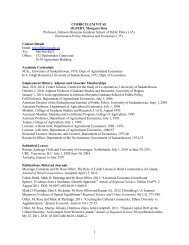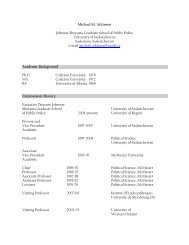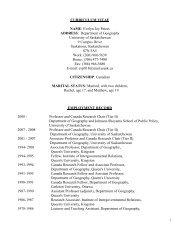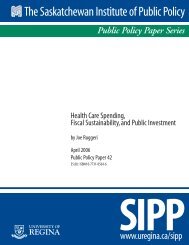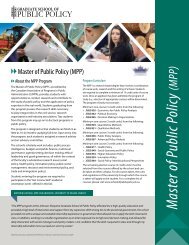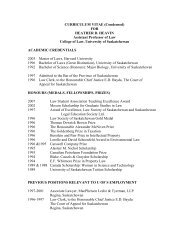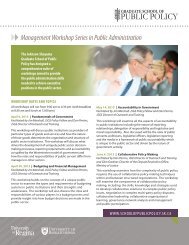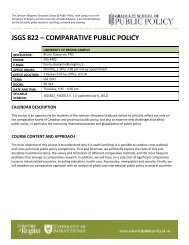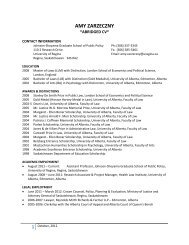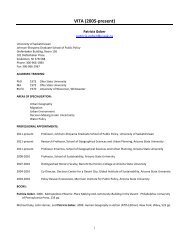Doctor of Philosophy (PhD) - Johnson-Shoyama Graduate School of ...
Doctor of Philosophy (PhD) - Johnson-Shoyama Graduate School of ...
Doctor of Philosophy (PhD) - Johnson-Shoyama Graduate School of ...
You also want an ePaper? Increase the reach of your titles
YUMPU automatically turns print PDFs into web optimized ePapers that Google loves.
<strong>Doctor</strong> <strong>of</strong> <strong>Philosophy</strong> in Public Policy<br />
The <strong>Doctor</strong> <strong>of</strong> <strong>Philosophy</strong> in Public Policy (<strong>PhD</strong>) <strong>of</strong>fers learning and research opportunities for highly qualified<br />
students to advance knowledge and move the study <strong>of</strong> public policy forward. Students graduating from this<br />
program will be in a position to train the next generation <strong>of</strong> public service pr<strong>of</strong>essionals and to conduct public<br />
policy and management research for government, business, think tanks, and other research organizations.<br />
The <strong>PhD</strong> program is designed for completion in three years <strong>of</strong> full-time study. Students may also choose to<br />
study part time over a maximum <strong>of</strong> six years. In either case, the program involves a combination <strong>of</strong> course<br />
work (culminating in a comprehensive exam) and proposing, writing, and defending a dissertation. Students<br />
who are engaged in the program on a full-time basis can expect to receive financial support. The <strong>PhD</strong><br />
program is currently being <strong>of</strong>fered through the University <strong>of</strong> Saskatchewan campus only.<br />
The school’s faculty have significant research backgrounds and interests in three areas: health and<br />
social policy; science, technology, and innovation; and trade and transnational regulation. This provides<br />
opportunities for students to explore topics in areas such areas as higher education, health and social policy,<br />
Aboriginal Peoples and public policy, the social economy, international trade agreements, innovation and<br />
science policy, regulation, and economic and cultural development.<br />
core Courses:<br />
Students are required to complete nine credit units (three courses)<br />
from the following core set <strong>of</strong> courses:<br />
PUBP 810 – Qualitative Methods and Research Design<br />
OR<br />
PUBP 811 – Quantitative Methods and Research Design<br />
PUBP 820 – Comparative Public Policy *<br />
PUBP 830 – Decision Making in Organizations<br />
* PUBP 820 can be satisfied by successfully completing one <strong>of</strong> the following courses –<br />
PUBP 812 (Aboriginal Peoples and Public Policy), PUBP 813 (Higher Education Policy),<br />
PUBP 814 (Social Policy: An Interdisciplinary Perspective), or PUBP 815 (Innovation<br />
Policy) <strong>of</strong>fered at the University <strong>of</strong> Saskatchewan campus, or GSPP 822 (Comparative<br />
Public Policy) <strong>of</strong>fered at the University <strong>of</strong> Regina campus,. Students may also select<br />
a different course with comparative policy content <strong>of</strong>fered by either the University <strong>of</strong><br />
Saskatchewan or the University <strong>of</strong> Regina and approved by the student’s advisory<br />
committee.<br />
Students who have taken one or more <strong>of</strong> these courses previously<br />
(i.e., in a master’s program) will be required to substitute an<br />
additional course or courses. Students may take additional courses in<br />
a particular subject area if they wish, subject to the approval <strong>of</strong> their<br />
advisory committee.<br />
Exams<br />
Students entering the <strong>PhD</strong> program are required to pass a qualifying<br />
exam. This exam may be waived for students with a master’s degree<br />
(with thesis) in public policy from a recognized university and for<br />
students with a master’s degree (with thesis) in a cognate field (e.g.,<br />
economics, political science, political sociology, public or educational<br />
administration). Normally this examination is administered within<br />
the first year, preferably within the first four months, <strong>of</strong> a student<br />
beginning the <strong>PhD</strong> program.<br />
Students will complete a comprehensive exam following their<br />
prescribed course work. The comprehensive exam will involve the<br />
preparation <strong>of</strong> a paper and an oral exam. The paper will be linked<br />
to the research program that the student has identified. Following<br />
successful completion <strong>of</strong> the comprehensive exam, students will<br />
move to the development <strong>of</strong> a dissertation proposal, and upon its<br />
approval, to the dissertation research. Students will be given the<br />
option <strong>of</strong> using either the standard dissertation structure or the<br />
three-paper model.<br />
<strong>PhD</strong><br />
<strong>Doctor</strong> <strong>of</strong> <strong>Philosophy</strong> (<strong>PhD</strong>) The
FUNDING<br />
Highly qualified doctoral students who are engaged in the program on a full-time basis can expect<br />
to receive funding at a competitive rate to support their research. All complete applications<br />
received by February 1, 2010, will be considered for funding.<br />
ADMISSION REQUIREMENTS<br />
Applicants to the <strong>PhD</strong> program must have a master’s degree in public policy, public administration,<br />
or in a cognate discipline such as economics, political science, political sociology, or educational<br />
administration, with a minimum average <strong>of</strong> 75 percent in that program.<br />
To apply to the program, applicants are required to submit a research program statement that outlines<br />
the research that they would like to pursue in the area <strong>of</strong> public policy. This statement should include<br />
a well-defined problem statement, a review <strong>of</strong> the appropriate literature, an initial methodology, and<br />
a statement indicating the significance/relevance <strong>of</strong> such a research program. While students will not<br />
be held to the research program that they outline, the document will serve to guide the student and<br />
their committee with the courses and the material they explore through their course work.<br />
Students with a master’s degree (with thesis) in public policy will be required to take a minimum<br />
<strong>of</strong> nine credit units (three courses) <strong>of</strong> course work at the <strong>PhD</strong> level. Each student will have their<br />
own faculty advisory committee. Students accepted into the program without this public policy<br />
background will be required to complete additional courses, as deemed necessary by their<br />
committee, for their successful completion <strong>of</strong> the program. All doctoral students must also enrol<br />
in PUBP 990 (seminar) and in PUBP 996 (research). In certain cases, students may be admitted on<br />
condition <strong>of</strong> satisfactory completion <strong>of</strong> all or a specified core <strong>of</strong> MPA/MPP courses and/or a qualifying<br />
examination <strong>of</strong> their prerequisite background for doctoral studies in public policy.<br />
Transfer from master’s program<br />
Exceptional students may be considered for a transfer from the school’s MPP or MPA program to<br />
the <strong>PhD</strong> program, following completion <strong>of</strong> at least 15 credit units <strong>of</strong> the core courses required for<br />
the MPP (MPA students who wish to be considered must take MPP core courses through their<br />
electives). Students seeking a transfer will be required to pass a qualifying exam. Three letters <strong>of</strong><br />
recommendation (typically from faculty in the school) in support <strong>of</strong> the transfer must be provided.<br />
TUITION<br />
The tuition for the <strong>PhD</strong> program is $1,030 per term, and students are required to maintain continuous<br />
registration. With three terms a year, the cost is $3,090 per year plus applicable student fees.<br />
Students should plan on spending three to four years in the <strong>PhD</strong> program. Tuition and fees are subject<br />
to change.<br />
MORE INFORMATION<br />
For more information regarding our programs,<br />
campuses, and how to apply, please visit<br />
www.school<strong>of</strong>publicpolicy.sk.ca.<br />
APPLICATION DEADLINES<br />
Students can enter the <strong>PhD</strong> program only in fall (September). The following application deadlines<br />
should be noted:<br />
• February 1 (guaranteed funding consideration)<br />
• May 1 (possible funding consideration)





